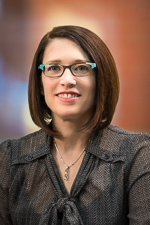Inclusivity in Laboratory Medicine: Endocrine Testing in Transgender Individuals
Choosing the right laboratory test for any clinical situation can be difficult. One particularly complex situation is choosing appropriate testing for transgender and nonbinary patients. Gender and sex are words that many use interchangeably, however, understanding their differences is key to creating systems that accurately represent transgender patients. Correct identification and representation of all people and clinical scenarios allows laboratories to provide an accurate result for the right test.
Originally presented on March 24, 2022, in Salt Lake City, Utah.
Lecture Presenter
 | Joely A. Straseski, PhD, MS, MT(ASCP), DABCC Professor (Clinical) |
Dr. Straseski is a professor (clinical) at the University of Utah School of Medicine. She received her PhD in pathology and laboratory medicine and a master of science in bacteriology from the University of Wisconsin-Madison, where she also served as a postdoctoral associate in the Department of Pathology. Dr. Straseski completed a postdoctoral fellowship in clinical chemistry at the Johns Hopkins Medical Institutions in Baltimore, Maryland. She is an active member of the American Association for Clinical Chemistry and American Society for Clinical Pathology, a fellow of the AACC Academy, and the chair of the board of editors for Clinical Laboratory News. Dr. Straseski is board certified in clinical chemistry by the American Board of Clinical Chemistry.
Objectives
After this presentation, participants will be able to:
- Define terms associated with the gender identity of transgender and nonbinary individuals, including sex, gender, the prefixes cis- and trans-, gender incongruence, and gender dysphoria
- Identify the utility and mechanism of gender-affirming hormone therapies in transgender and nonbinary individuals
- Evaluate the utility of immunoassay and mass spectrometry methods for both testosterone and estrogen measurements
- Describe possible solutions to laboratory-specific challenges faced by transgender individuals
Sponsored by:
University of Utah School of Medicine, Department of Pathology, and ARUP Laboratories
 Site Search
Site Search






